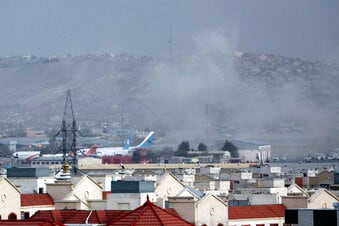U.S. Central Command has for the first time publicly identified the ISIS-K facilitator it says was killed in an Aug. 27 drone attack in Nangahar, Afghanistan.
Kabir Aidi, aka Mustafa, “was an ISIS-K high profile attack lethal aid facilitator involved in attack planning and magnetic IED production,” Army Maj. John Rigsbee, a CENTCOM spokesman, said in a statement. “Post-strike reflections indicate that Kabir Aidi was directly connected to the ISIS-K leaders that coordinated the August 26 attack at [Hamid Karzai International Airport].”
That attack killed 13 U.S. service members in the bloodiest single day for Americans since 2011. Scores of Afghans were also killed.
Hours after the airport attack, President Joe Biden, heavily criticized for the deadly chaos in Kabul, vowed payback.
“I’ve ordered my commanders to develop operational plans to strike ISIS-K assets, leadership and facilities,” Biden said in a White House address at the time. “We will respond with force and precision at our time, at the place we choose, in a moment of our choosing.”
The weapon of choice was a drone.
“U.S. military forces conducted an over-the-horizon counterterrorism operation today against an ISIS-K planner,” said Navy Capt. Bill Urban, the CENTCOM spokesman, in a statement after the attack.
“The unmanned airstrike occurred in the Nangahar Province of Afghanistan,” Urban said. “Initial indications are that we killed the target. We know of no civilian casualties.”
The HKIA attack, wasn’t the first connected to Aidi
He had been involved in enabling previous attacks in Kabul, Rigsbee said, including the Kabul University attack on Nov. 2, 2020.
“He was directly connected to threat streams in Kabul throughout the non-combatant evacuation at the Hamid Karzai International Airport,” said Rigsbee, including “the reported distribution of explosives and suicide vests.”
Another U.S. drone strike on Aug. 29 proved to be a deadly mistake, killing 10 Afghan civilians, including seven children.
U.S. military officials walked back their initial assessment that ISIS-K members were killed in that attack, later admitting that they mistakenly targeted an Afghan aid worker.
“This strike was taken in the earnest belief that it would prevent an imminent threat to our forces and the evacuees at the airport, but it was a mistake,” Marine Gen. Frank McKenzie, CENTCOM’s commander, told reporters last week, confirming that no ISIS fighters are believed to have been killed in the attack.
Howard Altman is an award-winning editor and reporter who was previously the military reporter for the Tampa Bay Times and before that the Tampa Tribune, where he covered USCENTCOM, USSOCOM and SOF writ large among many other topics.




